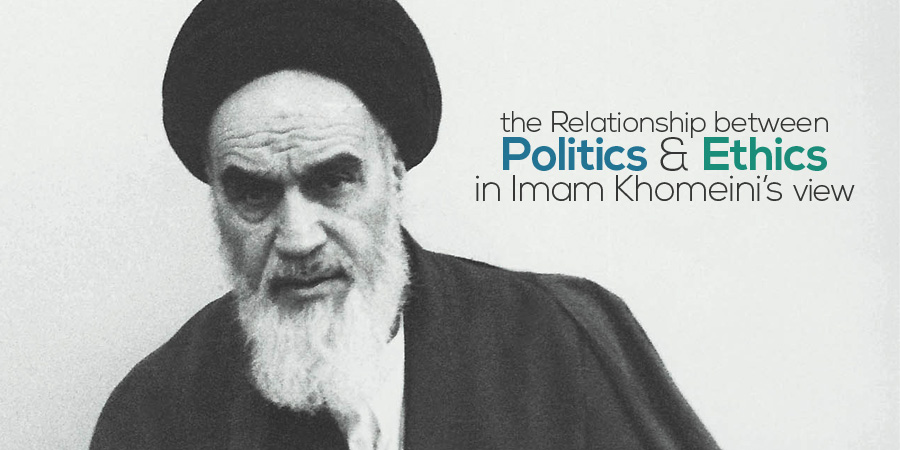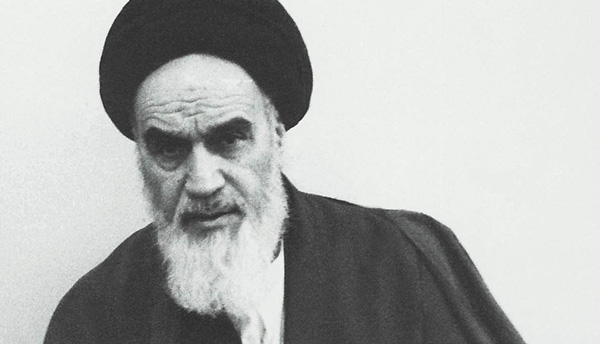What is the Relationship of Politics and Ethics in Imam Khomeini’s view? (3)

Politics as indispensable for the realization of Islam
Imām lived at a time when, owing to the influence of extensive propaganda of the antagonists, and the ineffectual actions of the protagonists, serious doubts on Islam and its functioning has arisen in people’s minds. One of these doubts concerned the relationship between Islam and politics, and the duty of the religious scholars vis-à-vis politics.
The outcome of these doubts was the preponderance of the notion of separation of religion and politics, which the Imām used to attack severely, viewing it as an offshoot of the imperialist designs. At various places, he used to speak of the role of Islam in politics and also about the duty of all Muslims to be involved in politics and that the two were inseparable.
On various occasions he would point to the episode of Pākravān, the Head of the State Organization for Security and Information (SAVAK) of the Shāh’s regime, and his (Pākravān’s) views on the nature of politics and on the clergy keeping away from this chicanery [pedar-sūkhtegīh][1] saying that it was an imperialist design which a number of religious people believed.[2] And ‘politically-minded’ clergyman [ākhūnd-e siyāsī] in our religious culture was more a fault-finding [term], and even a term of vilification. “Once they find a fault with a particular cleric [ākhūnd], they say that he is a politically-inclined clergyman.”[3]
This is while if we do not take the social precepts of Islam into account, nothing will be left of this pure religion except a spiritless skeleton. The principal part of Islam is concerned with its social aspect; giving effect to this depends on having power and being the ruler. As such, Islam cannot be regarded as merely a personal religion and the private matter of an individual. This notion that politics can be separated from religion is either the outcome of the misconception of the principle of religion, or the effect of the propaganda of the ill-wishers. If man is a social and political being, and if we accept that Islam is all-embracing and has a plan for every dimension of man, the logical implication of these premises is that religion is not separate from politics. So, all this talk about religion and politics being separate is suspicious.
This slogan of the separation of religion from politics and the demand that Islamic scholars should not intervene in social and political affairs have been formulated and propagated by the imperialists; it is only the irreligious who repeat them. Were religion and politics separate in the time of the Prophet (s)? Did there exist, on one side, a group of clerics, and opposite it, a group of politicians and leaders?
Were religion and politics separate in the time of the caliphs—even if they were not legitimate—or in the time of the Commander of the Faithful (‘a)? Did two separate authorities exist? These slogans and claims have been advanced by the imperialists and their political agents in order to prevent religion from ordering the affairs of this world and shaping Muslim society.[4]
According to the Imām, [Islam] is a school of thought which, contrary to non-monotheist schools of thought, has function and jurisdiction in all aspects of the individual and society, material and spiritual, culture and politics, military and economy. It has not neglected any point including the most trivial one, which has a role in the nourishment of man and the society as well as in the material and spiritual advancement.[5]
With such an approach, basically, one who speaks about the separation of the two categories has indeed not understood the function and nature of neither of the two. “The meaning of ‘What have we to do with politics?’ is that we should totally put Islam aside; Islam ought to be set aside; Islam must be buried in our chambers; Islam must be buried in our books.”[6]
In the view of the Imām, “Basically, the foundation of Islam is in politics.”[7] “The Messenger of God (s) has laid the edifice of politics in piety.”[8] “From the time of the Messenger of God (s) up to the period when there was not yet any deviation, politics and piety were in tandem.”[9]
These topics have been repeated time and again, and are more understandable and acceptable particularly in light of the definition of politics that he gives. As stated in the previous discussion, in his view, “Politics is meant to guide the society and take it forward. It should take into account all the interests of the society; it should consider all the dimensions of man and society and lead them to whatever is to their good, the good of the nation and of the individuals. This is specific to the prophets (‘a).”[10]
With this perspective, all the decrees and laws of Islam have a political facet and “The religion of Islam is a political religion; it is a religion in which everything is politics, including its acts of devotion and worship.”[11] In this view too, “The moral precepts of Islam are political as well.”[12]
Written by Sayyid Hasan Islami
Translated by Mansoor L. Limba
References:
[1] For example, see Sahīfeh-ye Imām, vol. 1, p. 269; vol. 8, p. 185; vol. 9, p. 177; vol. 10, p. 124; vol. 13, p. 431.
[2] Ibid., vol. 5, p. 40.
[3] Ibid., vol. 3, p. 227.
[4] Wilāyat-e Faqīh, p. 16.
Imām Khomeinī, Islamic Government: Governance of the Jurist, trans. Hamīd Algar (Tehran: The Institute for Compilation and Publication of Imām Khomeinī’s Works, Autumn 2002), p. 16. Electronic version of the whole book is downloadable at the Institute’s Translation Unit Website,
http://www.geocities.com/icpikw/wilayat.zip. [Trans.]
[5] Sahīfeh-ye Imām, vol. 21, pp. 402-403.
[6] Ibid., vol. 3, p. 338.
[7] Ibid., vol. 18, p. 72.
[8] Ibid., vol. 17, p. 204.
[9] Loc. cit.
[10] Ibid., vol. 13, p. 432.
[11] Ibid., vol. 10, p. 15.
[12] Ibid., vol. 13, p. 130.


